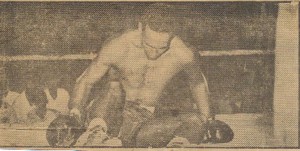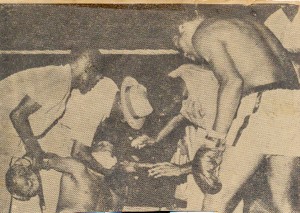By Eion Jardine
The recent death of Courts Pacesetters basketball player Kevin Worrell made me remember the death of another athlete in another sport many years ago.

That person was a boxer in his first professional bout and he died fighting to provide for his wife and children, unlike Worrell who died for absolutely nothing at all other than for his love of the sport.
When Henry Brown stepped into the ring that dreadful night on September 30, 1962 against Linton John he did not do so for fame or glory.
All he wanted was to win the purse of $48 to give his wife so she could go shopping for herself and their six children.
He won the purse all right. But with it came sudden death.
Henry Alwin Brown, former amateur champion of Berbice, won his first professional fight but lost his life.

It was the final round and indeed the late stages of the six round, welterweight contest when a crashing left hook to Brown’s jaw was followed by another left which also connected.
The punches caused Brown to crash to the canvas. The impact caused by his head hitting the canvas (much like how Worrell’s head must have hit the asphalt surface of the Burnham Court) reverberated across the ground and was heard by the crowd of approximately 2000 who had gone to the Georgetown Cricket Club ground for the bout which was organized by Dr. Deryck Lyder and Leon Williams assisted by referee William `Bill’ Brown.
According to a report in the Guyana Graphic after Brown fell flat on his back referee Bill Brown said:”I sent John to a neutral corner to commence the count and at that point the bell rang.
“I left Brown on the floor to check my points, as it was his seconds’ worry then. Some 10 seconds later I cast my vote and I saw that Brown was still out.
When the collector of votes informed me that Brown was the winner, I went over to raise his hand and found that he was still unconscious.
I sent for the doctor but saw then that he was already on his way to the ring. Dr. H.C. Hugh and Brown’s handlers began working on the stricken fighter before Leon Willems, director of the bouts, instructed that the boxer be carried to the dressing room.
A short while after I heard that Brown was dead.”
Brown was 27 years-old. It was his first professional bout.
His wife Joan, sobbing bitterly at the loss of her husband declared:”Henry was the pride of my heart,” the newspaper reported.
“He was always willing to do something for the children or me. I didn’t want to go to the fight but he insisted that I must go and so I went,” she added. “As he skipped into the ring he got a big cheer from the crowd but I did not realize that it was the last time that I would see him enter a ring.”
Joseph Abrahams, an old friend of the deceased said Brown was out of work for a long time after losing his job at Kwakwani, Berbice River and needed some money to give to his wife to go shopping.
“His last words to me were “I’m going to win, I need the cash,’” said Abrahams.
John, whose left hook sent Brown crashing to his death was a very sad man.
“I’m through with boxing,” he said. “I just can’t have anything to do with the game anymore,” he added.
“I will donate my entire purse to Mrs. Brown,” he said.
One month after the fatality, the British Guiana Boxing Board of Control held a benefit card at the GCC ground for Brown.
Bill Brown, the third man in the ring that sad night subsequently resigned from officiating.
“I don’t think anyone is more careful than I when it comes to looking after a boxer,” declared the former British amateur boxer.
“I am sorry for John, he did what was expected of him but I cannot understand how Brown died, he was in no trouble until the last few seconds when John made his final assault.”
Referee Brown had emphasized that the standard of the officials was good and that the arrangements and the organizing were comparable with what could be found abroad.
He stressed that although officials were unpaid, the board’s financial position was not as good as the general public assumed.
Seven days after the death of Brown, the British Boxing Board of Control issued a statement exonerating referee Bill Brown from any blame for the cause of the death of Henry Brown.
Firstly, they found that Brown was properly examined by Dr. R. T. Bayley on the morning of September 30 and that a “Certificate of Fitness to contest was issued in accordance with the rules of the board.”
Secondly, they also said that a medical officer of the board was present in the form of Dr. H. Hugh and “that he was in the ring immediately afterwards to render assistance to the boxer.”
Thirdly, the statement pointed out that “the fight could not be termed rough in any way and that neither of the boxers showed signs of rough treatment in the closing minutes of the contest.” And fourthy, “That the blows which Brown received in the last stages of the sixth round were not particularly heavy and were delivered by a faded opponent.”
The members of the British Guiana Boxing Board of Control unanimously agreed to forward a cheque to Brown’s widow as a token of their deepest sympathy.








